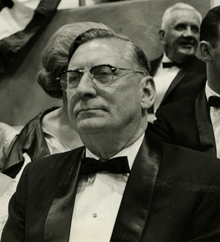Ross Barnett
Ross Robert Barnett (born January 22, 1898 in Standing Pine , Leake County , Mississippi , † November 6, 1987 in Jackson , Mississippi) was an American politician and from 1960 to 1964 governor of the state of Mississippi.
Early years
Ross Barnett took the soldier as US Army at the First World War in part. He then attended Mississippi College until 1922 and then studied at the University of Mississippi until 1926 law. He then practiced in Jackson as a successful criminal defense lawyer. Over the years he rose to be one of the finest attorneys, making over $ 100,000 a year. Between 1943 and 1945 he was chairman of the Mississippi Bar Association.
Political career
Barnett became a member of the Democratic Party . Apart from the post of governor, he has never sought or held any political office. In 1951 and 1955 he was defeated in the gubernatorial elections. In 1959 he was elected to the highest office in his state, which he assumed on January 19, 1960. During his tenure, Mississippi celebrated the 100th anniversary of the outbreak of the American Civil War . Governor Barnett visited the battlefields of that war and remembered the fallen Mississippi soldiers. Barnett was also a racist. In 1962, against his opposition and under pressure from the Supreme Court, James Meredith was the first African-American student to be admitted to the University of Mississippi. That was, against Barnett's will, the beginning of racial integration in schools and universities in Mississippi. Governor Barnett was fined and jailed for resisting, but failed to serve because the verdict was overturned by another court. In the aftermath, the governor remained true to his racist attitudes, which led to race riots in Mississippi. Barnett was a member of the White Citizens' Council , an organization that believed in the superiority of the white race .
In 1964, the racist murderer Byron De La Beckwith was charged with the murder of the black civil rights activist Medgar Evers . Governor Barnett and Army Major General Edwin A. Walker visited him during the trial. The testimony of a witness interrupted Barnett in the courtroom and shook hands with the killer. He also visited him in custody. Two juries consisting entirely of white jurors prevented De La Beckwith from being convicted twice this year. It was not until the 1990s that De La Beckwith was tried again and convicted of murder.
Independently of these events, the laws on compensation for victims of industrial accidents were improved and the state's industry was promoted. Over 40,000 new jobs were created. Barnett's tenure ended on January 21, 1964. He then returned to work as a lawyer. In 1966 he attacked Robert F. Kennedy over the racial issue, calling him a "sick and dangerous American". A year later, Barnett failed in his party's gubernatorial primary. Ross Barnett died on November 6, 1987. He had three children with his wife, Mary Pearl Crawford.
Honors
The Ross Barnett Reservoir, north of Jackson , Mississippi, and Barnett Lake in Smith County , Mississippi are named after him.
literature
- Robert Sobel and John Raimo (Eds.): Biographical Directory of the Governors of the United States, 1789–1978. Volume 2, Meckler Books, Westport, 1978. 4 volumes.
Web links
- Ross Barnett at the National Governors Association (English)
- Mississippi Historical Society ( Memento from July 2, 2019 in the web archive archive.today )
- Ross Barnett in the database of Find a Grave (English)
Individual evidence
- ^ Claude Sitton : NAACP Leader Slain in Jackson; Protests Mount . In: New York Times . 13 June 1963. reprinted in Clayborne Carson, David J. Garrow, Bill Kovach: Reporting Civil Rights: American journalism, 1941-1963 ( s ). Library of America , 2003, pp. 831-835 (Retrieved September 14, 2011).
| personal data | |
|---|---|
| SURNAME | Barnett, Ross |
| ALTERNATIVE NAMES | Barnett, Ross Robert (full name) |
| BRIEF DESCRIPTION | American politician |
| DATE OF BIRTH | January 22, 1898 |
| PLACE OF BIRTH | Standing Pine , Mississippi |
| DATE OF DEATH | November 6, 1987 |
| Place of death | Jackson , Mississippi |

